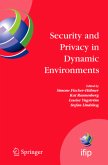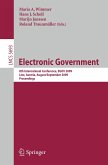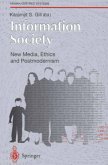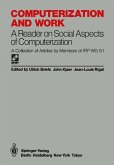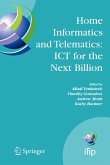Simone Fischer-Hübner / Kai Rannenberg / Louise Yngström / Stefan Lindskog (eds.)Proceedings of the Ifip Tc-11 21st International Information Security Conference (SEC 2006), 22-24 May 2006, Karlstad, Sweden
Security and Privacy in Dynamic Environments
Proceedings of the Ifip Tc-11 21st International Information Security Conference (SEC 2006), 22-24 May 2006, Karlstad, Sweden
Herausgegeben:Fischer-Hübner, Simone; Rannenberg, Kai; Yngström, Louise; Lindskog, Stefan
Simone Fischer-Hübner / Kai Rannenberg / Louise Yngström / Stefan Lindskog (eds.)Proceedings of the Ifip Tc-11 21st International Information Security Conference (SEC 2006), 22-24 May 2006, Karlstad, Sweden
Security and Privacy in Dynamic Environments
Proceedings of the Ifip Tc-11 21st International Information Security Conference (SEC 2006), 22-24 May 2006, Karlstad, Sweden
Herausgegeben:Fischer-Hübner, Simone; Rannenberg, Kai; Yngström, Louise; Lindskog, Stefan
- Gebundenes Buch
- Merkliste
- Auf die Merkliste
- Bewerten Bewerten
- Teilen
- Produkt teilen
- Produkterinnerung
- Produkterinnerung
This book contains the Proceedings of the 21st IFIP TC-11 International Information Security Conference (IFIPISEC 2006) on "Security and Privacy in Dynamic Envir- ments" held in May 22-24 2006 in Karlstad, Sweden. The first IFIPISEC conference was arranged in May 1983 in Stockholm, Sweden, one year before TC- 1 1 was founded, with the active participation of the Swedish IT Security Community. The IFIPISEC conferences have since then become the flagship events of TC-11. We are very pleased that we succeeded with our bid to after 23 years hold the IFIPISEC conference again in Sweden. The IT…mehr
Andere Kunden interessierten sich auch für
![Security and Privacy in Dynamic Environments Security and Privacy in Dynamic Environments]() Security and Privacy in Dynamic Environments112,99 €
Security and Privacy in Dynamic Environments112,99 €![Electronic Government Electronic Government]() Electronic Government38,99 €
Electronic Government38,99 €![Information Society Information Society]() Information Society75,99 €
Information Society75,99 €![Computerization and Work Computerization and Work]() Computerization and Work39,99 €
Computerization and Work39,99 €![Home Informatics and Telematics: ICT for the Next Billion Home Informatics and Telematics: ICT for the Next Billion]() Alladi Venkatesh / Timothy Gonzalves / Andrew Monk / Kathy Buckner (eds.)Home Informatics and Telematics: ICT for the Next Billion75,99 €
Alladi Venkatesh / Timothy Gonzalves / Andrew Monk / Kathy Buckner (eds.)Home Informatics and Telematics: ICT for the Next Billion75,99 €![Innovation in Manufacturing Networks Innovation in Manufacturing Networks]() Américo Azevedo (ed.)Innovation in Manufacturing Networks75,99 €
Américo Azevedo (ed.)Innovation in Manufacturing Networks75,99 €![Human Work Interaction Design: Designing for Human Work Human Work Interaction Design: Designing for Human Work]() Human Work Interaction Design: Designing for Human Work75,99 €
Human Work Interaction Design: Designing for Human Work75,99 €-
-
This book contains the Proceedings of the 21st IFIP TC-11 International Information Security Conference (IFIPISEC 2006) on "Security and Privacy in Dynamic Envir- ments" held in May 22-24 2006 in Karlstad, Sweden. The first IFIPISEC conference was arranged in May 1983 in Stockholm, Sweden, one year before TC- 1 1 was founded, with the active participation of the Swedish IT Security Community. The IFIPISEC conferences have since then become the flagship events of TC-11. We are very pleased that we succeeded with our bid to after 23 years hold the IFIPISEC conference again in Sweden. The IT environment now includes novel, dynamic approaches such as mobility, wearability, ubiquity, ad hoc use, mindhody orientation, and businesslmarket ori- tation. This modem environment challenges the whole information security research community to focus on interdisciplinary and holistic approaches whilst retaining the benefit of previous research efforts. Papers offering research contributions focusing on dynamic environments in addition to other aspects of computer security and privacy were solicited for submission to IFIPISEC 2006. We received 141 submissions which were all reviewed by at least three members of the international program committee.
Produktdetails
- Produktdetails
- IFIP Advances in Information and Communication Technology 201
- Verlag: Springer / Springer US / Springer, Berlin
- Artikelnr. des Verlages: 11736394, 978-0-387-33405-9
- 2006 edition
- Seitenzahl: 494
- Erscheinungstermin: 25. April 2006
- Englisch
- Abmessung: 236mm x 157mm x 33mm
- Gewicht: 924g
- ISBN-13: 9780387334059
- ISBN-10: 038733405X
- Artikelnr.: 20946915
- Herstellerkennzeichnung
- Libri GmbH
- Europaallee 1
- 36244 Bad Hersfeld
- gpsr@libri.de
- IFIP Advances in Information and Communication Technology 201
- Verlag: Springer / Springer US / Springer, Berlin
- Artikelnr. des Verlages: 11736394, 978-0-387-33405-9
- 2006 edition
- Seitenzahl: 494
- Erscheinungstermin: 25. April 2006
- Englisch
- Abmessung: 236mm x 157mm x 33mm
- Gewicht: 924g
- ISBN-13: 9780387334059
- ISBN-10: 038733405X
- Artikelnr.: 20946915
- Herstellerkennzeichnung
- Libri GmbH
- Europaallee 1
- 36244 Bad Hersfeld
- gpsr@libri.de
Dr. Kai Rannenberg (Universität Freiburg, Institut für Informatik und Gesellschaft, Abteilung Telematik, www.iig.uni-freiburg.de/ kara) hat Informatik, Wirtschafts- und Rechtswissenschaften studiert. Er koordiniert das Kolleg "Sicherheit in der Kommunikationstechnik" der gemeinnützigen Gottlieb Daimler- und Karl Benz-Stiftung. Seit 1990 arbeitet er auf dem Gebiet IT-Sicherheitszertifizierung, u. a. bei DIN und ISO an der Normung von IT-Sicherheitsevaluationskriterien.
Privacy and Privacy-Enhancing Technologies I.- Improving Availability of Emergency Health Information without Sacrificing Patient Privacy.- Ensuring Privacy for Buyer-Seller E-Commerce.- A General Certification Framework with Applications to Privacy-Enhancing Certificate Infrastructures.- Security in Mobile and Ad Hoc Networks.- Authenticated Query Flooding in Sensor Networks.- Identity Based Message Authentication for Dynamic Networks.- Providing Authentication and Access Control in Vehicular Network Environment.- Trust and Security Management.- A Framework for Web Services Trust.- Trust: An Element of Information Security.- Security-by-Ontology: A Knowledge-Centric Approach.- Privacy Enhancing Technologies II.- A Methodology for Designing Controlled Anonymous Applications.- Design Options for Privacy-Respecting Reputation Systems within Centralised Internet Communities.- Protecting (Anonymous) Credentials with the Trusted Computing Group's TPM V1.2.- Attacks, Vulnerability Analysis, and Tools.- Analysis and Improvement of Anti-Phishing Schemes.- CAT - A Practical Graph & SDL Based Toolkit for Vulnerability Assessment of 3G Networks.- Protecting Web Services from DoS Attacks by SOAP Message Validation.- Access Control and Authentication I.- A Flexible and Distributed Architecture to Enforce Dynamic Access Control.- A Paradigm for Dynamic and Decentralized Administration of Access Control in Workflow Applications.- CAS++: An Open Source Single Sign-On Solution for Secure e-Services.- Security Protocols.- A Synchronous Multi-Party Contract Signing Protocol Improving Lower Bound of Steps.- On the Cryptographic Key Secrecy of the Strengthened Yahalom Protocol.- Sealed-Bid Micro Auctions.- Intrusion Detection.- Detecting Known and Novel Network Intrusions.-Evaluating Classifiers for Mobile-Masquerader Detection.- VisFlowCluster-IP: Connectivity-Based Visual Clustering of Network Hosts.- Usability and Awareness.- A Usability Study of Security Policy Management.- Considering the Usability of End-User Security Software.- Utilizing the Common Criteria for Advanced Student Research Projects.- Privacy Enhancing Technologies III.- On the Relationship of Privacy and Secure Remote Logging in Dynamic Systems.- Privacy-Preserving Shared-Additive-Inverse Protocols and Their Applications.- Access Control and Authentication II.- Click Passwords.- Cryptographically Enforced Personalized Role-Based Access Control.- Access Control and Authentication III.- Using VO Concept for Managing Dynamic Security Associations.- Secure Fast Handover in an Open Broadband Access Network using Kerberos-style Tickets.- Forensics.- Network Forensics on Packet Fingerprints.- Oscar - File Type Identification of Binary Data in Disk Clusters and RAM Pages.- IFIP WG 11.1/11.8 Security Culture Workshop.- Organizational Security Culture: More Than Just an End-User Phenomenon.- Cyber Security Training and Awareness Through Game Play.- Internalisation of Information Security Culture amongst Employees through Basic Security Knowledge.- Bridging the Gap between General Management and Technicians - A Case Study in ICT Security.- Value-Focused Assessment of Information Communication and Technology Security Awareness in an Academic Environment.- Using Phishing for User Email Security Awareness.- IFIP WG 11.4 I-NetSec'06 Workshop.- Anonymous Credentials: Opportunities and Challenges.- Practical Private Regular Expression Matching.- A System for Privacy-Aware Resource Allocation and Data Processing in Dynamic Environments.- The APROB Channel: AdaptiveSemi-Real-Time Anonymous Communication.
Privacy and Privacy-Enhancing Technologies I.- Improving Availability of Emergency Health Information without Sacrificing Patient Privacy.- Ensuring Privacy for Buyer-Seller E-Commerce.- A General Certification Framework with Applications to Privacy-Enhancing Certificate Infrastructures.- Security in Mobile and Ad Hoc Networks.- Authenticated Query Flooding in Sensor Networks.- Identity Based Message Authentication for Dynamic Networks.- Providing Authentication and Access Control in Vehicular Network Environment.- Trust and Security Management.- A Framework for Web Services Trust.- Trust: An Element of Information Security.- Security-by-Ontology: A Knowledge-Centric Approach.- Privacy Enhancing Technologies II.- A Methodology for Designing Controlled Anonymous Applications.- Design Options for Privacy-Respecting Reputation Systems within Centralised Internet Communities.- Protecting (Anonymous) Credentials with the Trusted Computing Group's TPM V1.2.- Attacks, Vulnerability Analysis, and Tools.- Analysis and Improvement of Anti-Phishing Schemes.- CAT - A Practical Graph & SDL Based Toolkit for Vulnerability Assessment of 3G Networks.- Protecting Web Services from DoS Attacks by SOAP Message Validation.- Access Control and Authentication I.- A Flexible and Distributed Architecture to Enforce Dynamic Access Control.- A Paradigm for Dynamic and Decentralized Administration of Access Control in Workflow Applications.- CAS++: An Open Source Single Sign-On Solution for Secure e-Services.- Security Protocols.- A Synchronous Multi-Party Contract Signing Protocol Improving Lower Bound of Steps.- On the Cryptographic Key Secrecy of the Strengthened Yahalom Protocol.- Sealed-Bid Micro Auctions.- Intrusion Detection.- Detecting Known and Novel Network Intrusions.-Evaluating Classifiers for Mobile-Masquerader Detection.- VisFlowCluster-IP: Connectivity-Based Visual Clustering of Network Hosts.- Usability and Awareness.- A Usability Study of Security Policy Management.- Considering the Usability of End-User Security Software.- Utilizing the Common Criteria for Advanced Student Research Projects.- Privacy Enhancing Technologies III.- On the Relationship of Privacy and Secure Remote Logging in Dynamic Systems.- Privacy-Preserving Shared-Additive-Inverse Protocols and Their Applications.- Access Control and Authentication II.- Click Passwords.- Cryptographically Enforced Personalized Role-Based Access Control.- Access Control and Authentication III.- Using VO Concept for Managing Dynamic Security Associations.- Secure Fast Handover in an Open Broadband Access Network using Kerberos-style Tickets.- Forensics.- Network Forensics on Packet Fingerprints.- Oscar - File Type Identification of Binary Data in Disk Clusters and RAM Pages.- IFIP WG 11.1/11.8 Security Culture Workshop.- Organizational Security Culture: More Than Just an End-User Phenomenon.- Cyber Security Training and Awareness Through Game Play.- Internalisation of Information Security Culture amongst Employees through Basic Security Knowledge.- Bridging the Gap between General Management and Technicians - A Case Study in ICT Security.- Value-Focused Assessment of Information Communication and Technology Security Awareness in an Academic Environment.- Using Phishing for User Email Security Awareness.- IFIP WG 11.4 I-NetSec'06 Workshop.- Anonymous Credentials: Opportunities and Challenges.- Practical Private Regular Expression Matching.- A System for Privacy-Aware Resource Allocation and Data Processing in Dynamic Environments.- The APROB Channel: AdaptiveSemi-Real-Time Anonymous Communication.


